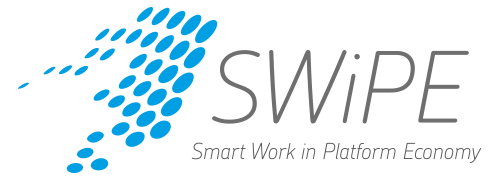
Platform economy work can be looked at from many perspectives (see e.g. Kenney & Zysman 2016, The Rise of the Platform Economy, Science and Technology, XXXII/3). For the occasional service provider Uber or Airbnb enables the conversion of idle time and underutilised capital – a car or a spare bedroom – to money. Buying the car or a flat to gain income through these platforms doesn’t, in practice, differ from a traditional taxi service or from running a bed and breakfast. Even on tori.fi where buying and selling stuff creates opportunities to earn, this activity can evolve into a more traditional kind of professional retail.
The platform economy also allows one to leverage one’s own human capital. A popular blog writer can benefit through advertising, free samples and event appearances. One can sell one’s work for – relatively brainless – clicking on Mechanical Turk (by answering repeatedly to the question; is there a cat in this picture?), for website search engine optimisation on UpWork – with a contract at a good income level, or even for solving research questions on InnoCentive, where the largest single rewards are on the order of hundreds of thousands.
Digital platforms allow many who have been left outside the labour market to contribute their labour to worthwhile pursuits. In principle, the use of labour inputs and capital becomes more efficient. However, in the real world, where most platforms are funded by private equity, platform partners receive only that part which is needed to keep them in the game. The rest goes to the platform and its owners. Platforms built as public goods or cooperatives do exist, but they are in a clear minority.
Digital platforms have a tendency to reconstruct old market patterns in new configurations – and so far as this construction goes; those that were on the market prior to the platform lose out.
In light of current empirical data, it appears that selling one’s labour on a platform is for most a hobby or source of additional earnings. As a primary source of income, those income streams are somewhat limited and come sporadically. In addition, when compared to more regular salaried employment, income distribution is more uneven in the platform economy. That is those earning relatively good wages are a small proportion of those offering their labour on the platform.
While digital platforms broaden/deepen labour markets and selling one’s labour input is voluntary, it is the community that should benefit from platforms being used to exchange labour inputs. This is the case in principle and on the upper level of service providers; in practice, however, the case is more complex from the perspective of individual actors.
In thinking about the practical benefits of platforms it would perhaps be a good idea to consider why people join platforms. These reasons for joining platforms I discussed in my earlier blog.
Why is there friction in the market in the first place – friction that the platform is set out to reduce? Take taxi regulation; motives include ensuring service quality and safety alongside guaranteeing service availability throughout the day – every day – regardless of the passenger and their attributes. In addition, the fact that demand is more predictable with regulation is not without import. This has helped investment in equipment and made taxi drivers incomes relatively stable.
Why does a platform deepen/broaden a market? Was that particular market illegal for a good reason or perhaps the platform enables copyright infringement for example? Does the platform cast down the benefits brought about by unionisation and so changes the delicate balance between work and capital?
When we consider whether to allow a platform to function it follows that we are actually considering whether to remake the rules of the game in that particular market. Often that process will bring up issues that previously did not need to be articulated at all clearly. The starting point should be that all business activity is in itself permitted, but so that the requirements and regulation that accrue to them are equal to those of other ways of doing business. Naturally all business activity must also adhere to the values of their society, in addition to ethical and moral norms. Because the externalities and effects of platforms are difficult to predict owing to the scarcity of prior experience, it may be a good idea to regulate platforms by permitting their activity on a time limited basis (for example by permitting an otherwise legal platform to operate for a 5-10 year term before a final decision is made on what regulation to impose).
Digital platforms offer great potential while their emergence is often unavoidable. As a society we ought to be open minded towards them, even when they represent the new ways of buying and selling labour as well as new ways of working.
The author Petri Rouvinen (PhD) is an economist specialising in innovation activity, technology, competitiveness, globalisation and issues in entrepreneurship. He is a research director at ETLA – the Research Institute of the Finnish Economy, and is CEO of Etlatieto.
Read more abour Research Director Petri Rouvinen, his work and areas of expertise here.
